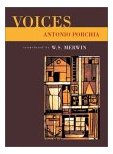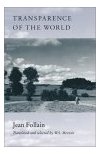|
Contents » Cover |
||
|
Essays
Copper Canyon has admirably taken upon itself to reprint a number of W. S. Merwin's early books and translations. This revised and enlarged edition of Porchia's aphorisms comes at a time when Americans know so little of themselves or why the world is. An Italian immigrant to Argentina, Porchia lived humbly and near poverty all of his life. Voices was his only work. These 600 utterances reveal a highly imaginative and wise mind at labor. Many resonate with the revealed wisdom of the Tao, the spiritual leaping of Blake, or the modernist dismay of Kafka, and yet Porchia was virtually unlearned in the great thinkers and writers. His work, then, originates in the pure ground of human wisdom from which the "greats" excavate. Porchia's private soul suffered and wrote a testament of universal value. Here are a few aphorisms:
He who has seen everything empty itself is close to knowing what everything is filled with. May we hear such a voice when it calls from the wilderness. Merwin's two volumes of Selected Translations were some of my Bibles as a young poet-in-training looking for examples beyond the confessional mode that was taking (has now taken) the country by storm in the 70s. That's where I first read a few of Merwin's Follain translations and so later came to immerse myself in Transparence of the World here reprinted, and Mary Feeney and William Matthews' prose poem translations A World Rich in Anniversaries. Follain's simple, miniature narratives evoke France right before The Great War and before and after World War II. Thus they revolve around the transformations that overtook European culture. You can feel Follain's nostalgia for the rural peasant life while terrors built and eventually burst around him. The poems' painterly descriptions tell more than they say: "A house roof and the star / growing pale above it / held the glance of a man / who felt himself caught again / in the delicate play of causes / . . . a wide open window / showed the ochre wall and the cupboard / and the hand laying an iron spoon / on the china of a plate / where it was chipped long ago." ("Dawn") One comes to realize that Follain, indeed, saw Blake's "universe in a grain of sand" for his poems grow inside you until they become massive with implications. Their precise and authentic descriptions move from the personal to the complex whole. Time seems almost forlorn and plodding, and yet Follain's real subject is the way time transforms, takes, replaces, remakes, and then reveals what Merwin calls "processions" of an "immeasurable continuum." "Where are you lying / secret of the world / with so strong an odor? / Sometimes a gentle workman / in the feverish town / falls from a scaffolding / and the wind goes on smelling of lilac." ("The Secret")
|
||||||||

